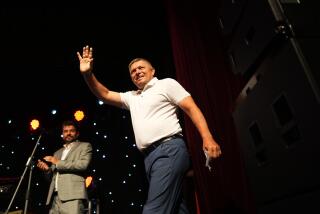Serb Nationalists Top Bosnia Polls
- Share via
BANJA LUKA, Bosnia-Herzegovina — Washington’s effort to neutralize Bosnian Serb nationalists faces a serious threat today as the party founded by indicted war crimes suspect Radovan Karadzic goes into elections well ahead in opinion polls.
The Serbian Democratic Party, or SDS, which Karadzic created a decade ago to promote Bosnian Serb nationalism, insists it has nothing more to do with Karadzic. Five years after the end of the Bosnian war, he is still in hiding to escape arrest on charges of genocide and other war crimes.
The U.S. has pumped tens of millions of dollars in aid into Republika Srpska, the Serbian-controlled sector of Bosnia-Herzegovina, to reward its people for electing pro-Western Prime Minister Milorad Dodik in 1997. His critics accuse him of doing nothing to stop endemic corruption.
“We have an incredible contradiction,” said Perica Vucinic, who leads an anti-corruption crusade as editor in chief of the independent Reporter magazine. “Dodik was always a defender of democracy against [former Yugoslav President] Slobodan Milosevic. On the other hand, we had the black market which brought in a flood from Slobodan Milosevic’s Serbia,” the dominant Yugoslav republic.
Dodik denies the corruption allegations, and his campaign manager, Slavko Mitrovic, said he is confident of victory today.
Western aid has helped make Banja Luka, the Bosnian Serbs’ capital, a boomtown in a blighted land under Dodik, because sanctions were lifted after he took office.
As Dodik dropped in the opinion polls, U.S. Ambassador Thomas Miller issued a clear warning several weeks ago that Bosnian Serb voters should be careful how they vote if they want that U.S. aid to continue.
Miller insisted in an interview Friday in Bosnia’s capital, Saravejo, that he wasn’t telling anyone how to vote, but just letting them know that “U.S. assistance is not an entitlement program. Nobody is owed anything in this country.
“We have a lot of concerns about the SDS party,” the U.S. ambassador added. “Not only about their past, but about people who are in the SDS now who are holding office.”
By threatening Bosnian Serb voters, Miller is trying to force them to vote for Dodik even though the prime minister has done nothing to earn their votes, Vucinic argued.
“I regret that Thomas Miller, who is an excellent ambassador, has made such a mistake,” he added. “I know that he has come with a long list of demands to Mr. Dodik, and Mr. Dodik has fulfilled very few of these demands.”
Dodik’s failure to clamp down on corrupt officials and arrest war crimes suspects is “stupid politics” that undermines Western promises that Bosnia will be able to survive as a united state on its own, Vucinic said.
To Vucinic, and other moderate analysts, foreign efforts to build a tolerant democracy here were stillborn. Selective banning of candidates and constant tinkering with election rules and other laws are doomed to fail, he said.
“We should have established a protectorate, but it’s too late for that now,” Vucinic said. “More than $5 billion [in aid] . . . and this country has changed too little. Only the facades have changed. People live bad lives, people are very poor, and the mafia has the money.”
The SDS, now headed by Mirko Sarovic and several other Karadzic allies, maintains that it is committed to the peace accords reached in Dayton, Ohio, in 1995. The accords ended 3 1/2 years of brutal war by creating a Bosnian state divided between the Muslim-Croat Federation and Republika Srpska.
But the International Crisis Group, a respected research organization, called on Bosnia’s foreign administrators to ban the SDS after finding that many war crimes suspects continue to wield power throughout the Bosnian Serb republic.
“They continue to work in the police force, hold public office, exercise power through the legal and illegal economy or influence politics from behind the scenes,” the independent think tank reported Nov. 2.
“Many meet frequently with international officials and representatives” of the peacekeeping force led by troops from the North Atlantic Treaty Organization, the report charged.
Karadzic is believed to be hiding in Bosnia, moving from house to house, constantly protected by bodyguards and communicating with political allies through letters delivered by loyal couriers.
A poll published last week showed the SDS’ Sarovic leading with 38%, followed by Dodik with 22%. The same poll puts Sarovic’s nationalists well ahead in the race for the Bosnian Serb assembly, with 34% support--double the figure for Dodik’s party.
Based on the polls, Sarovic would look like a sure winner, but the foreign administration running Bosnia changed the voting rules in Republika Srpska. This latest change makes an already complicated system more difficult for many voters to figure out.
Instead of simply marking a single X, they are now urged to list their preferences by marking the numbers 1, 2, 3 and so on beside candidates’ names on the ballot.
If no presidential candidate wins more than 50% of the vote, the vote counters re-sort the ballots, remove the least preferred candidates from the running, and count again. The re-sorting and recounting continues until someone has a majority.
But the new “preferential voting” rules apply only to the Bosnian Serb republic, and not the federation between Bosnian Muslim and Croat entities.
More to Read
Sign up for Essential California
The most important California stories and recommendations in your inbox every morning.
You may occasionally receive promotional content from the Los Angeles Times.













